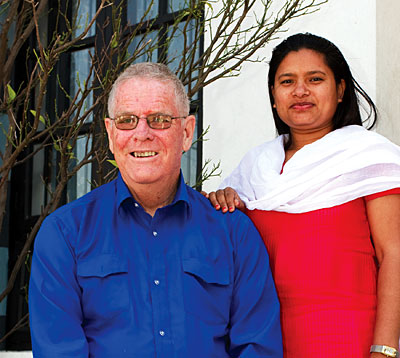 FOO CHEE CHANG |
Srijana Singh and Father Brooks are on a mission to make Nepalis happy.
In 2008, they started Loyola Talim Sewa (LTS), a counselling centre, to help Nepalis develop interpersonal skills. "We want to help people deal with the emotional problems Nepal's political and social changes have thrown up," says Brooks.
The problems are evident everywhere, they explain. Youth are more violent, ordinary people, having despaired of genuine political and economic changes, are increasingly frustrated, and in the rush to claim new rights, matters of identity like sexuality are challenging the status quo. LTS believes such problems could be dealt with better if people learned to communicate with each other.
"So often, people don't really acknowledge one another's pain. They simply tell each other not to worry about their problems, without really making the effort to understand how they are feeling," says Singh.
LTS offers training in civic and moral education, counselling and leadership at its centre in Golphutar. It also works with NGOs and other organisations to train their staff. The training is more facilitated discussion than spoon-fed instruction, with participants put into groups and encouraged to open up to one another. Unlike other counselling services, LTS seeks to help people by empowering them to help themselves and those around them.
"We don't begin by telling people they are sick and then diagnose illnesses. We give them the skills necessary to help themselves and live life more fully," explains Brooks. It's an approach that has served him well in the last 45 years, during which he worked extensively with young people (including serving as principal at St. Xavier's School for 10 years). He is now reaching out to a broader and more mature audience through LTS.
The centre is getting results. It helped one woman overcome a fear of men that she had had ever since being molested by her father at a young age. She is now happily married and has a child. LTS also helped a man come to grips with his homosexuality, a fact which led to frustration and caused him to behave violently.
Yet the challenges are steep. "We really expect a lot a trust from the people we help," says Singh. "Many of the people we see tell us things they wouldn't dare tell their own parents. But Nepali culture isn't exactly welcoming of this kind of trust."
Singh and Brooks are currently working on a book about LTS and counselling, and plan to continue working in Nepal for many years to come. Here's to hoping they make Nepal a happier place in the process.


